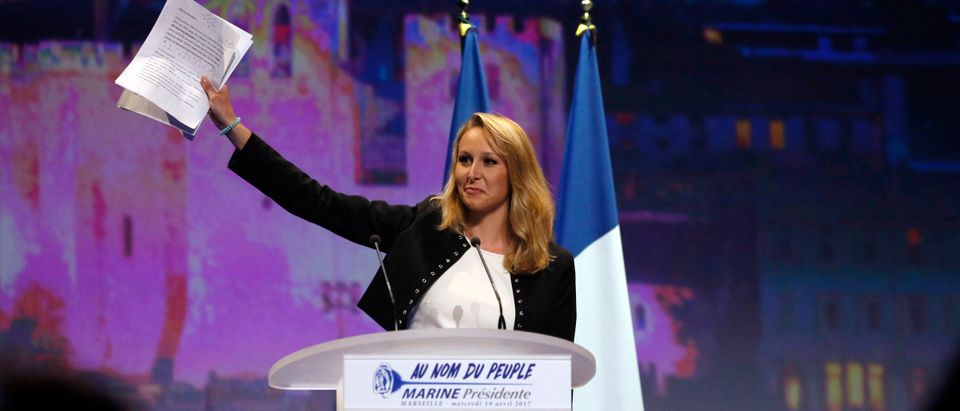CPAC’s most talked about speaker this year isn’t the president or a cable TV personality.
It’s French politician Marion Marechal-Le Pen, the niece of the nationalist leader Marine Le Pen.
Le Pen’s inclusion in CPAC is causing much outrage among anti-Trump conservatives. The aggrieved bemoan this development as a sign of how the Conservative Political Action Conference is no longer conservative and has sold out to the dark forces of nationalism and populism.
The 28-year-old Le Pen is no conservative, the NeverTrumpers argue. She’s a big government socialist and doesn’t believe in classical liberalism enough. She’s also a crypto-Nazi, they say, who shares none of the same eternal conservative values CPAC is supposed to uphold.
But it appears the only eternal value for conservatives, according to Le Pen’s critics, is love of the free market, not wanting to conserve your nation and traditions.
CPAC, however, is actually in luck on the free market question with Le Pen. Marion is much more pro-free market than her aunt Marine and represents the traditional conservative faction of the National Front, which opposes the heterodoxy of the party’s leaders. Marion is also a devout Catholic who strongly opposes abortion and wants faith to play a greater role in French public life, much like social conservatives in America.
One reason why disgruntled conservatives hate the younger Le Pen is because they think she shares the same economic views as her aunt, which is not true. But the primary motivation for opposition is that she’s just too nationalist. Le Pen is too focused on immigration and too tainted by her grandfather’s extremism to be welcome at CPAC, so her critics argue.
It is interesting that NeverTrumpers insist that Le Pen is not a real conservative when her Catholic conservatism is far older than National Review. The main purpose of her ideology is to conserve France, which would make sense calling her a “conservative.” It appears her critics want their own narrow view of conservatism to be the sole definition of it — a definition, it should be noted, that leaves it unclear what exactly they’re trying to conserve.
CPAC is supposed to be a big tent event where multiple elements of the political Right come to share their views. It’s not the sole domain of one ideology, and Le Pen represents the populist insurgency riling up European politics at the moment. For an event that has hosted Nigel Farage multiple times, it makes sense for the most conventionally conservative National Front leader to receive an invite.
Yes, she’s controversial. Yes, she’s not a typical American conservative. Yes, her grandfather is an extremist. Who cares?
Many of the critics would like the conservative conference to focus more on ideas than entertainment. Le Pen offers that, and can contribute to a debate on what is the future of the political Right. She is certainly a better choice than Jonathan Krohn, the conservative teen who earned a prime speaking slot at CPAC in 2009 to discuss the “future of conservatism.” Krohn became a liberal just a few years later as he got older.
It’s hard not to see conservative outrage over Le Pen’s choice as a case of sour grapes.
“I won’t be attending, thanks. Haven’t been invited in good faith for years,” National Review’s Jonah Goldberg huffed on Twitter.
Goldberg and other Trump critics would rather have a conference dominated by people like themselves, but instead they aren’t even invited to speak anymore. Conservatism is changing in the age of Trump, and CPAC is reflecting that by inviting Le Pen, something that wouldn’t have been dreamed of in 2015.
Many of these “true conservatives” have been losing out in the age of Trump. They are no longer the stars of Fox News. The average Republican voter views them with contempt for their criticism of Trump, and the rank-and-file certainly ignored these voices when they kept shouting Trump wasn’t a real conservative. Trump critics can no longer claim they represent the base, as some, like Erick Erickson and Glenn Beck, once did in the early days of the tea party.
It’s led to such bizarre events as Goldberg trashing “Conservatism Inc.” — a term crafted by paleoconservatives to critique pundits like Jonah Goldberg. Such is the state of affairs when populist-nationalists now have a seat at the table.
CPAC has always been an event where some of its main speakers were not in the good graces of movement conservatives. I’m old enough to remember the grumbles over Ron Paul getting prime speaking slots, even though he was the main attraction for young people.
If the event primarily catered to the wishes of anti-Trump conservatives, it would pass into utter irrelevancy and not reflect current trends on the Right.
The majority of people who attend CPAC are Trump supporters who don’t want to shell out hundreds of dollars to be told they’re racist. They would also like speakers who reflect their views, not people who want to insist conservatism is solely about free markets, privatizing social security and open borders.
Populist-nationalism is all the rage nowadays and CPAC would look ridiculous if it had no nationalist speakers. This is what the people voted for in 2016 and what conservatives in Europe are embracing.
The people who insist inviting a prominent French politician to share what’s happening in Europe is a bad idea wish that conservatism stayed stuck in the early 2000s.
Times change, and CPAC is all the better for acknowledging that fact.
Follow Scott on Twitter and buy his new book, “No Campus for White Men“.


